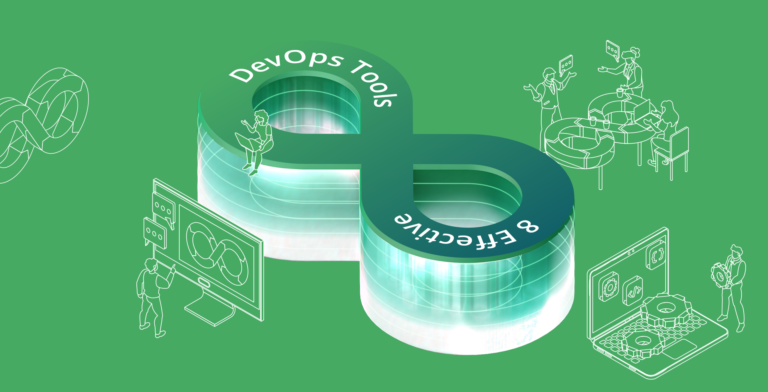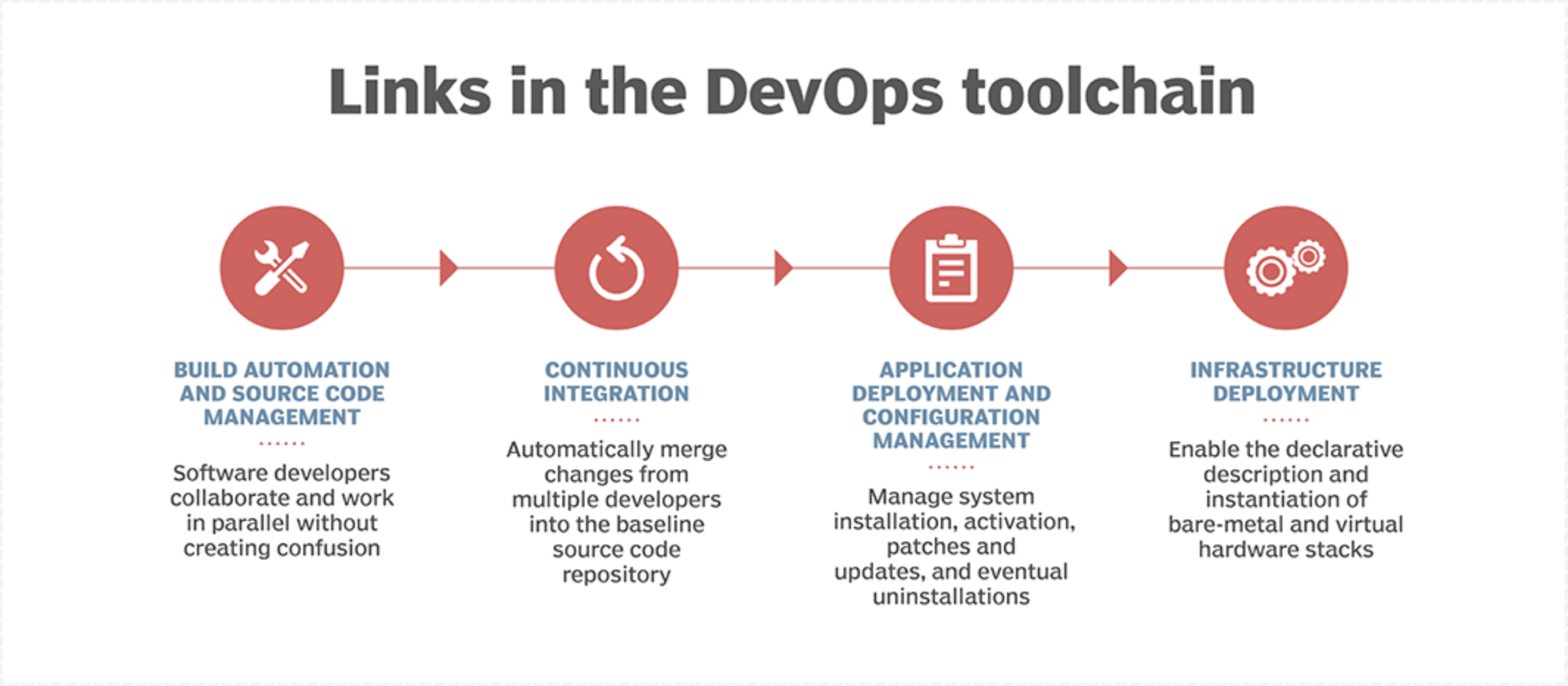
8 Effective DevOps Tools to Consider in 2022
With a decade’s worth of digital transformation crammed into a single year, the companies today are pressured more than ever to focus on business agility and engineering efficiency. Operational silos, however, still hinder cross-team collaboration and affect productivity. To overcome these barriers, businesses are increasingly investing in DevOps tools. DevOps, an approach designed to bring together development (Dev) and operational teams (Ops), has become crucial in helping businesses thrive in the new normal. The term first appeared in 2009 and has quickly achieved mainstream status. By ensuring continuous integration (CI) and enabling continuous delivery (CD) of value, DevOps offers a number of benefits. The DevOps Trends Survey by Atlassian and CITE revealed that:
- 99% of respondents say DevOps has had a positive impact on their organization
- 61% say it helped them produce higher quality deliverables
- 49% say they see a faster time to market
- 49% say it improved their deployment frequency

Source: TechTarget
To help you optimize your DevOps toolkit, here’s our expert advice on the most popular DevOps tools to keep an eye on in 2022.
Top 8 DevOps tools to build a high-performing DevOps toolchain
Kanda’s DevOps engineers have prepared the curated DevOps tools list that covers the main links in the DevOps toolchain.Best DevOps tool for build automation: Gradle
Gradle is an open-source tool that has gained popularity among DevOps teams for its flexibility and customization capabilities. Based on the concepts of Apache Ant and Apache Maven, Gradle uses a domain-specific language (DSL) to configure builds. Gradle also supports many popular programming languages such as Groovy, Java, Scala, Kotlin, C++, and Python. To top it off, Gradle has been selected as an official build tool for Android Studio. Gradle advantages:- Incremental builds allowing not to perform a task if nothing has changed
- Support for a wide range of IDEs (Android Studio, IntelliJ, Eclipse, Visual Studio, Xcode)
- Up to 100 times faster than Maven
- Concise build scripts and flexible script language
- Monorepo and multi-repo setups
 Source: Gradle[/caption]
Source: Gradle[/caption]
Best DevOps tool for source code management: Git
Effective version control is the cornerstone of any successful DevOps initiative. Git is a free and open-source distributed SCM (source code management) tool that can be used for projects of all sizes. One of the top DevOps tools, Git offers lightning-fast performance and a small footprint as the source code is easily compressed. Git advantages:- Native support for most protocols, including HTTP, HTTPS, FTP, FTPS, and SSH
- Cheap and easy-to-merge local branches
- Staging area to split large changes into logical, atomic commits
- Distributed nature for almost endless number of workflows
- Cryptographic data integrity by default

Source: cPanel
Best DevOps tool for continuous integration: Jenkins
Jenkins is one of the most popular open-source DevOps automation servers available in the market. Written in Java, Jenkins allows development teams to speed up the software delivery pipeline by automatically pulling incremental commits from a central repository and triggering new builds. With Jenkins, developers can further initiate automated build testing, get immediate feedback in case of any bugs or errors and fix them early on. Jenkins advantages:- Runs on Windows, Linux, and macOS
- The master-slave architecture to support distributed builds
- More than 1,800 community-developed plugins that make it easy to tailor the tool functionality according to your unique DevOps needs
- Rich API capabilities for seamless integration with a large number of DevOps tools, platforms, and environments

Source: Jenkins
Best DevOps tool for continuous delivery: Puppet
Puppet is one of the most advanced DevOps automation tools designed to help IT teams accelerate software delivery workflows. By leveraging a combined agent-based and agentless approach, Puppet enables organizations to automate their infrastructure at scale, ship changes faster, and streamline cloud-native deployments. Puppet advantages:- Open-source and commercial versions with comprehensive reporting and granular access control
- Works with Windows, Linux, and Unix-like OS
- Provides support for separate configurations of every host
- Monitors configuration changes at regular intervals to prevent bottlenecks

Source: Puppet
Best DevOps tool for configuration management: Chef
Released in 2009, Chef is still considered by many organizations to be the best DevOps platform for configuration management. Chef is written in Ruby and Erlang, that’s why it is ideal for DevOps teams working with imperative languages, including Ruby, Java, C++, and Python. One of the things that make Chef stand out is an extra layer (Workstations) with all the configurations that are first tested on local machines before pushing to the server. Chef advantages:- Easy integration with AWS, Azure, Google Cloud Platform, Rackspace, OpenStack, and other cloud platforms
- Seamless host dependencies management
- Support for Windows, macOS, Ubuntu, FreeBSD, RHEL/CentOS, AIX, and other more
- Comprehensive analytics and report generation capabilities
- An active and fast-growing community

Source: DevOps
Best DevOps tool for container orchestration: Docker
As containerization technology has become the de facto standard for modern, cloud-native solutions, Docker has become — and still is — the most popular DevOps tool for managing containers. This software containerization platform enables developers to easily build, deploy, run, update, and stop lightweight Docker containers — all with simple commands. Docker advantages:- Lightweight footprint since containers share the host’s operating system
- Portability across the entire development pipeline to reduce “it works on my machine” problem
- Strong isolation capabilities by default for better security
- Docker Hub that gives access to over 100,000 container images

Source: Docker
Best DevOps tool for infrastructure deployment: Terraform
Among the best DevOps software tools for infrastructure management, Terraform is the most popular Infrastructure as Code (IaC) solution. Terraform uses easy-to-read HashiCorp Configuration Language (HCL) to enable DevOps teams to configure, provision, and manage infrastructure across multiple cloud providers, including AWS, Azure, and GCP. Terraform advantages:- Orchestration support rather than just configuration management
- A declarative approach to define the desired end state for infrastructure rather than the specific order of steps
- Immutable infrastructure to provide more consistency and reliability
- Client-only architecture that leverages the APIs of a cloud provider, eliminating the need for additional configuration management and security checks

Source: Terraform
Best DevOps tool for monitoring: New Relic
Our list of DevOps tools to learn in 2022 would not be complete without New Relic, a powerful solution for continuous monitoring that helps developers gain deep insights into the performance of the entire software stack. New Relic brings all relevant metrics, events, logs, and traces under one roof, delivering full transparency into infrastructures, solutions, and even end-user experiences. New Relic advantages:- Real-time view of all operational data in one place
- Correlation of infrastructure performance with application health to speed up root cause analysis
- Applied intelligence for real-time anomaly detection
- Smooth integration with cloud providers, DevOps tools, and platforms

Source: New Relic
Wrapping up
Undoubtedly, DevOps has become a crucial component of the success of modern software companies. By streamlining collaboration between different teams, DevOps culture enables businesses to deliver products and services faster without compromising quality. That said, picking the right DevOps tech stack is not an easy task as there is no shortage of DevOps tools and technologies on the market today. Finding the right tools that meet your specific requirements may take some time as well as practice but once it’s all in place, you can start reaping the benefits of a custom DevOps toolchain like automated deployment pipeline and continuous value delivery.Related Articles

Comprehensive AI Security Strategies for Modern Enterprises
Over the past few years, AI has gone from a nice-to-have to a must-have across enterprise operations. From automated customer service to predictive analytics, AI technologies now handle sensitive data like never before. A Kiteworks report shows that over 80% of enterprises now use AI systems that access their most critical business information. This adoption…Learn Morearrow-right
Building Trust in AI Agents Through Greater Explainability
We’re watching companies leap from simple automation to an entirely new economy driven by self-governing AI agents. According to Gartner, by 2028 nearly a third of business software will have agentic AI built in, and these agents will be making at least 15% of everyday work decisions on their own. While that can significantly streamline…Learn Morearrow-right
Machine Learning for Fraud Detection: Evolving Strategies for a Digital World
Digital banking and e-commerce have changed how we transact, creating new opportunities for criminals. Businesses lose an estimated $5 trillion to fraud each year. The sheer number of fast-paced digital transactions is too much for older fraud detection methods. These traditional tools are often too slow and inflexible to stop today's automated threats. This new…Learn Morearrow-right
Software Development Life Cycle (SDLC): Helping You Understand Simply and Completely
Software development is a complex and challenging process, requiring more than just writing code. It requires careful planning, problem solving, collaboration across different teams and stakeholders throughout the period of development. Any small error can impact the entire project, but Software Development Life Cycle (SDLC) provides the much needed support to overcome the complexities of…Learn Morearrow-right

